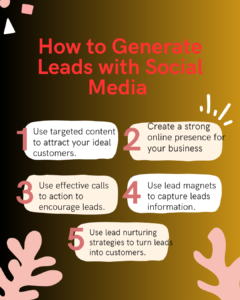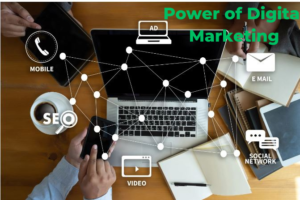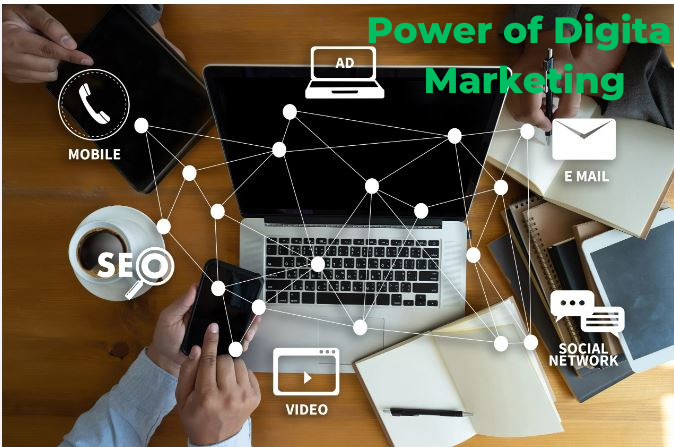Table of Contents
ToggleWhat is a lead?
Why is Lead Generation Important to Business
A lead is someone interested in what you are selling. That definition throws a wide net, so think of lead generation as guiding prospects from passively viewing your social media posts to following you. A lead has taken the initiative to share contact information. The goal of lead generation is to find potential customers and develop them through the process until they are ready to buy. When a customer is ready to buy, then you pass them to sales as a highly qualified lead.
Table of Contents:-
- What is a Lad ?
- What is Lead Generation?
- How to generate lead?
- Email Marketing.
- Social Media Marketing
- Why are Business Leads Important?
What is lead generation?
Lead generation is a marketing process of generating and capturing interest in a product or service. The purpose of the lead gen process is to guide prospective customers into the sales funnel and through the sales pipeline until they are ready to make a purchase. The prospects move through each level of qualification until they reach “hot leads”.
Lead generation is a complex process that increases brand awareness, builds community relationships, generates high-quality leads, and completes a sale. Your lead generation marketing process will be unique to your company’s needs but there are four essential stages: lead awareness, lead education, lead sampling, and lead conversion.
Why is Lead Generation Important to Business , How much is it important for businesses?
Leads are individuals or businesses that have shown interest in a company’s products or services. They are potential customers who have provided their contact information or engaged with the company in some way, indicating their potential as sales opportunities.
Leads are crucial for businesses for several reasons:
1. Sales Opportunities: 
Leads represent potential sales opportunities. By identifying and nurturing leads, businesses can convert them into paying customers and generate revenue.
2. Business Growth: A consistent flow of leads is essential for business growth. Without leads, businesses may struggle to acquire new customers and expand their customer base.
3. Targeted Marketing: Leads provide valuable information about the target audience. By understanding the characteristics, preferences, and needs of their leads, businesses can tailor their marketing efforts to reach the right people with the right message.
4. Relationship Building: Building relationships with leads is a key aspect of business success. By engaging with leads, providing relevant information, and addressing their concerns, businesses can establish trust and credibility, increasing the chances of converting them into loyal customers.
Compared to traditional marketing methods, generating leads can be a cost-effective strategy. By focusing on lead generation efforts, businesses can target specific demographics and individuals who are more likely to be interested in their offerings, maximizing the return on investment.
To effectively leverage leads, businesses employ lead generation strategies such as content marketing, social media marketing, email marketing, SEO, and advertising campaigns. Additionally, implementing lead management systems and processes helps track, categorize, and follow up with leads in a systematic and organized manner.
In summary, leads are essential for businesses as they represent potential customers, provide opportunities for sales and business growth, and enable targeted marketing efforts. Effective lead generation and management strategies can significantly contribute to a business’s success and profitability.
How to generate leads

How to generate leads
Lead generation marketing uses multiple channels to get potential customers to a landing page with a form to collect contact information. After filling out the contact form, the customer receives an offer (more on that in a minute) and a lead is generated.
Each promotional channel will target people in unique ways. If you are a tutoring service, you may reach out to school teachers by email inviting them to refer students. At the same time, you may reach out to parents with web content on preparing kids for SATs or ACTs. You may use Tik-Tok to reach students. The lead gen process gets complex quickly, so let’s look at some ways to generate leads.
Email Marketing
How does automating potential leads work? Let’s say a parent reads your Tweet offering students a free study plan for the SAT. When they click through the link on the Tweet, they arrive at a landing page with a simple form. Mailchimp automatically adds the information to your database.
By submitting their email address, the parent automatically receives a PDF with the study plan, but also a welcome package with pricing, service menu, success stories, and a call-to-action coupon. If the parent clicks the link on the coupon, they arrive at your booking calendar.
The booking calendar notifies the tutor and confirms the appointment. All this happens automatically. Even better, it is invisible to the customer. It takes time to set up the automation chain, but once it’s set, it saves hours of missed phone calls, checking calendars, and confirming appointments.
Social media Marketing
Social media gives marketers unprecedented opportunities to connect with consumers. A presence on social media platforms makes it easier for customers to find you by following hashtags or searching for keywords. Social media companies work to keep their customers actively engaged and marketers can build on this advantage. The result is increased brand awareness and a consistent marketing message.
Zapier’s Facebook Lead Ads generates leads by making it easy for users to sign up for ad campaigns. When a potential customer clicks on the lead ad, Facebook automatically loads their contact information. The Facebook leads information is saved to transport over to your Mailchimp list.
From your Mailchimp list, you can match new subscribers with relevant marketing campaigns. You can even create a poll to see what marketing is most useful to your subscribers. This is a simple data-driven approach to segmenting your audience and micro-target campaigns and special offers.
Zapier is just one of more than 250 platforms you can integrate with your Mailchimp account for data-driven marketing campaigns. Let’s look at Mailchimp for LinkedIn lead gen forms. These forms sync your LinkedIn contacts with your Mailchimp audience.
When a user clicks on a call to action, LinkedIn fills in her user information. This information transfers to your Mailchimp list. You can classify leads with predefined fields, hidden fields, custom questions, and consent fields. You can connect or disconnect Mailchimp for LinkedIn Lead Gen Forms in the Mailchimp integration directory.
Why are Business Leads Important?
Why are Business Leads Important?
Lead generation is a major component of any sales-led organization. Without business leads filling your sales funnel, sales reps are at a loss as to who to contact and try to sell to.
Ideally, lead generation occurs organically. When a complete stranger reaches out on their own volition and shows interest in your product, the relationship grows naturally and gives you a better chance to build authentic connections.
However, old-school lead gen techniques like cold calling and cold emailing can also prove effective when done correctly.
Why is Lead Generation Important to Business?
It is critical for a business to generate leads in order to succeed. Most firms will lack the sales and consumer base necessary to develop without leads. Customers are fickle, so companies can’t count on their instincts. They must use strategies in order to attract the types of consumers they wish to have.
Without such a strategy, a company will be unsure as to what kind of people it should be targeting – and without this identity, most companies will have trouble generating leads.
Typical businesses need a constant influx of potential clients to maintain their success.
The Power of Lead Generation: Fueling Business Growth and Success
In the digital age, lead generation has emerged as a crucial marketing process for businesses aiming to thrive and succeed. A lead is someone who expresses interest in a company’s products or services, and the goal of lead generation is to guide these prospects through the sales funnel until they are ready to make a purchase. In this post, we will explore the significance of lead generation for businesses and the key reasons why it is essential for driving sales opportunities, fostering business growth, and facilitating targeted marketing efforts.
Section 1: The Fundamentals of Lead Generation
Lead generation is the art of capturing and nurturing interest in a product or service, gradually converting potential customers into “hot leads” ready to make a purchase. By understanding the various stages of the lead generation process, businesses can optimize their strategies to effectively identify and engage with their target audience.
Section 2: The Importance of Leads for Business Success
Discover the pivotal role that leads play in a company’s growth and profitability. We will explore how leads represent valuable sales opportunities, provide insights into the target audience, and enable businesses to build strong relationships with potential customers.
Section 3: Unveiling the Four Essential Stages of Lead Generation
Delve into the intricacies of lead generation marketing with a focus on the four essential stages: lead awareness, lead education, lead sampling, and lead conversion. Each stage contributes to building brand awareness, cultivating community relationships, generating high-quality leads, and closing successful sales.
Section 4: Leveraging Lead Generation Strategies
Explore a myriad of effective lead generation strategies, including content marketing, social media marketing, email marketing, SEO, and advertising campaigns. We’ll highlight how these tactics can be tailored to meet specific business needs and target the right audience.
Section 5: Maximizing ROI with Efficient Lead Management
Effective lead management is crucial for capitalizing on potential opportunities. Discover the importance of implementing lead management systems and processes to track, categorize, and follow up with leads in a systematic and organized manner.
In conclusion, lead generation is a powerful marketing process that serves as the backbone of business growth and success. By understanding the significance of leads and the nuances of effective lead generation strategies, businesses can establish a robust foundation for achieving their goals. Embrace the power of lead generation to drive revenue, build strong customer relationships, and elevate your brand’s presence in the competitive market.
More..
https://mdzaka.com/
Why is Lead Generation Important to Business, How much is it Important for Businesses?
Creating a Successful Digital Marketing Strategy, What is Marketing Strategy 2023-24
How to Create a Best Landing Page 2023-24
https://mdzaka.com/what-is-pillar-page-types-of-pillar-pages-creating-an-effective-pillar-page/











